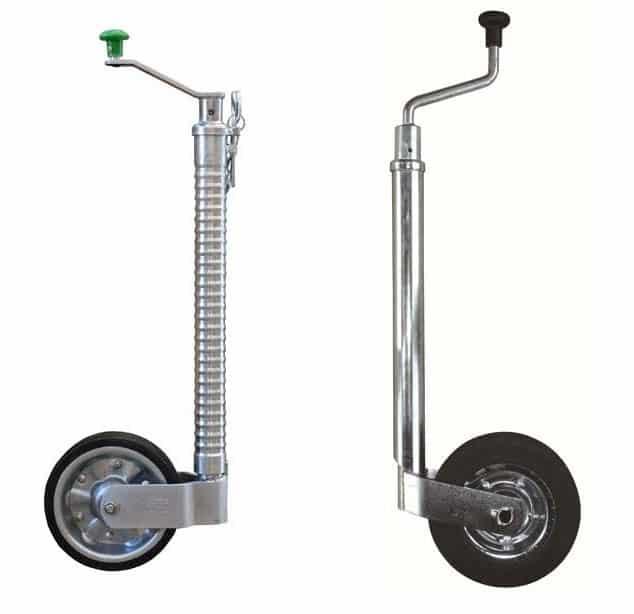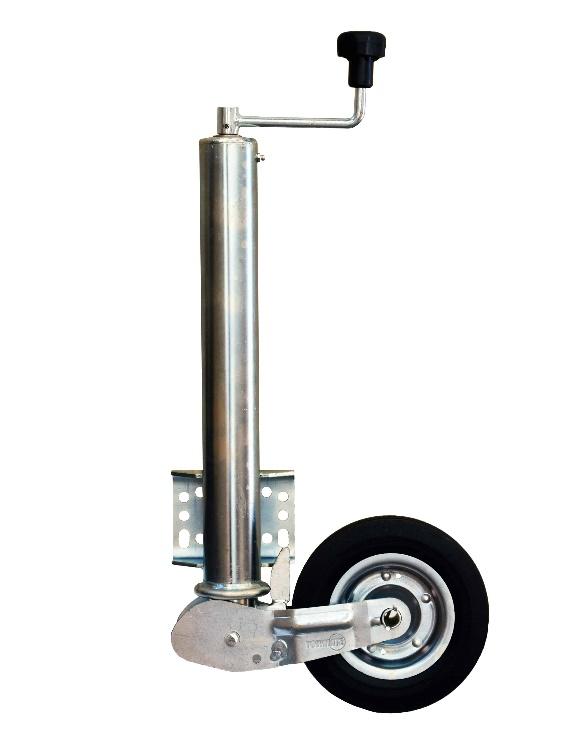Jockey wheels are an exceptionally essential but frequently overlooked part of a trailer. Due to their importance, deciding on the correct size to fit your trailer is crucial. The aim of a jockey wheel is to ensure the trailer is level while it is unhitched, keeping it stable when loading your trailer. Jockey wheels also aid in reducing the strain on your back, as they help provide manoeuvrability of the trailer.
Smooth or serrated jockey wheel?

This is the first question you may come across when selecting a jockey wheel. What is the prominent difference? The serrated jockey wheel has a ribbed outer sleeve, which is normally the case on heavy duty commercial trailers, with a diameter of 48mm or higher. A disadvantage of the serrated jockey wheel is that they require a clamp that matches the ribbing on the outer sleeve. The ribbing on the sleeve, however, helps solve the issue of the shaft sliding through the clamp.
On the other hand, smooth jockey wheels are highly common. Known for being a standard for most light to commercial duty trailers, the smooth jockey wheel is a highly popular choice. One disadvantage of a smooth jockey wheel is that when the clamp is not attached sufficiently tightened, the shaft can slip through the clamp and hit the road through travel. This could then lead to a damaged tyre and possibly the need to change the entire assembly.
What is a retractable jockey wheel?

The second question you might meet when looking for a jockey wheel is; what is a retractable jockey wheel? What is the difference? Well, a retractable jockey wheel eradicates the necessity for a clamp. As An Alternative, this one bolts directly onto the side of the trailer coupling, on a multi-hole fixing plate (usually on a square-tube coupling or t-pole coupling).
What do the different sizes mean?
The next point to consider is the variety in sizes across jockey wheels. There are two distinct sizes to consider. The most critical one is the diameter of the jockey wheel. At ATE, we stock six various diameters. The 35mm, 42mm, 48mm, 48mm serrated, 60mm, and 63mm.
The 60 and 63mm diameter are the least conventional choice, with the capability of up to 750kg nose-weight capacity. The width is particularly essential when choosing a jockey wheel, where the clamp is a part of the moulding on the complete coupling as this is not possible to change.
The second size to start thinking about is the open and closed height. It is available only on adjustable height ones and although this is less significant, it does help to know what range of lift is between these two heights.
So…in conclusion
There are a variety of points to take into account when choosing a jockey wheel; what type of trailer it is being used on, what diameter you need, whether you need a smooth or serrated one, and whether a retractable jockey wheel would be a good solution.
Remember however, that if you end up deciding a retractable one, you must make sure that there isn’t already a clamp on the coupling. In place there needs to be a multi-hole fixing plate through which it can be attached.
Leave a Reply